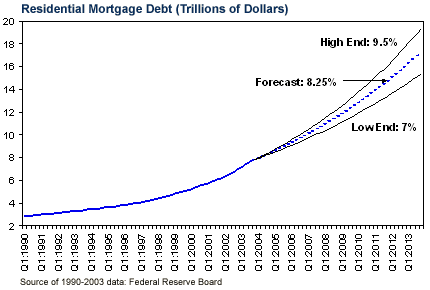On today's Wall Street Journal editorial page ('Mr. Greenspan's Cappuccino', available here for subscribers), Brian Wesbury presents statistics from an unnamed source that I find interesting, because they seem wrong:
Roughly 80% of all people between the ages of 50 and 64 own their own homes, versus 70.6% of people aged 35-49, and 69% of all Americans.I take issue with calling people with mortgages "homeowners": fantasy future homeowners is a better title. As long as that mortgage is there, everyone knows that the real homeowner is a big, faceless bank or mortgage company somewhere. Semantics aside, are these numbers correct? I know lots of older people who are not homeowners.
Then there was this quizzical set of statistics:
While many believe that irresponsible borrowing is creating a bubble in housing, this is not necessarily true. At the end of 2004, U.S. households owned $17.2 trillion in housing assets, an increase of 18.1% (or $2.6 trillion) from the third quarter of 2003. Over the same five quarters, mortgage debt (including home equity lines) rose $1.1 trillion to $7.5 trillion. The result: a $1.5 trillion increase in net housing equity over the past 15 months.Presumably its not much of a bubble if net housing equity is increasing.
My experience is that the bubble is affecting newer, younger entrants into the market much more than older, established 'homeowners.' Many young people, as a matter of necessity, do not expect to ever finish paying their mortgages. Rather they hope to get the biggest house they can, and hope to profit from the rapidly appreciating value of the housing. The housing bubble is affecting these people the most.
Here is an informative press release:
U.S. households net worth is now, according to the Federal Reserve, $48.5 trillion. Residential real estate accounts for almost $10 trillion ($17.2 trillion value minus mortgage debt of $7.5 trillion). Financial assets, including stocks, bonds, bank accounts and pension accounts, totaled $36.8 trillion.
The value of total household assets has risen nearly 20% since the end of 2000, but borrowing has risen at a much faster pace. The outstanding debt owed by households has soared 45% in that period, the Fed reported.
It may be that much consumer-oriented borrowing is, only lately, turning into a housing bubble. And notice that, if both quotes are correct, nearly all of the increase of housing asset value has occurred since 2003. Borrowing going up faster than equity?: Yup! A bubble!
Here is an interesting graphic from Freddie Mac showing that mortgage debt is likely to double over the next decade:

Mortgage debt will have to increase since wages aren't increasingly as rapidly as 8.25%. The money will have to be borrowed, likely from overseas. Will that much money be available? Quien sabe?! To me, economics novitiate but familiar enough with the dangers of exponential growth, it looks unsustainable. Notice that inflection point at the current date? They can't even get the current rate of increase correctly! This graph is showing low-ball estimates! It's likely that residential mortgage debt will double in five years, not ten! Who is going to finance this bubble?
No comments:
Post a Comment